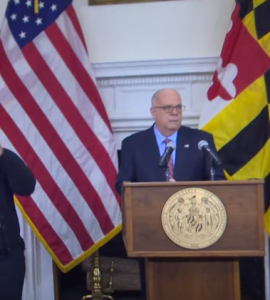They will need to get COVID shots if they don’t have them already.

Annapolis, Md (KM) There are some new vaccination protocols for employees of nursing homes and hospitals in Maryland. During his news conference in Annapolis on Wednesday, Governor Larry Hogan announced that all staff at nursing homes and hospitals need to be vaccinated against COVID-19.
“Every nursing home employee will be required to show proof of vaccination,”: Governor Hogan says. “If they are unable to, they will be required to submit to regular, ongoing, COVID screening and testing.”:
Hogan said a total of 79% of the employees in nursing homes are fully vaccinated and at 18 nursing homes, 95% of the staff is vaccinated. But he noted at a few nursing homes, only 40% of employees are vaccinated, and that’s “unacceptable.”
“We will be redoubling our enforcement actions for nursing homes that do not comply with State Health Department protocols, and/or which consistently fail to report their vaccination data,” the Governor continued. “We’re also doubling the fines, and stepping up civil penalties.”
There are 227 nursing homes in Maryland.
Joe Demattos, with the Health Facilities Association of Maryland, says he supports the Governor’s decision. “Vaccination remains the single best tool to fight COVID-19, to avoid hospitalization, and to avoid death,” he says.
Governor Hogan also says he’s ordering hospital employees be vaccinated against COVID-19. He noted that many hospitals in the state already do, but not all “So today we’re also instituting vaccinations protocols for all staff working in all Maryland Hospitals,” he says. “These new requirements for both nursing home and hospital employees will take affect immediately. All these employees are required to get their first vaccines no later than September 1st.”
Also at his news conference, Governor Hogan called for the US Food and Drug Administration to make booster shots available immediately for seniors and vulnerable populations, and for full, expedited approval of vaccines for five to 11-year-olds.
By Kevin McManus